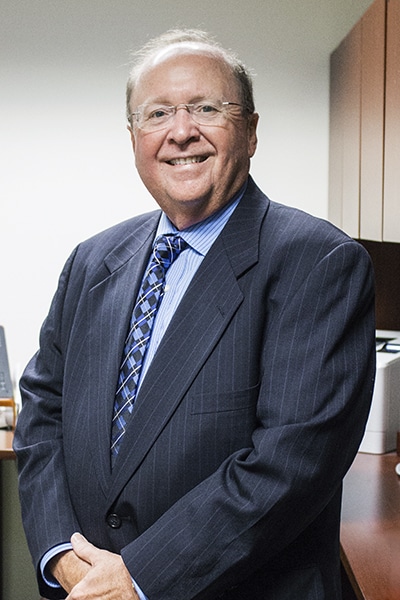Bob Bacon returned to his office in University City, the academic heart of Philadelphia, after a week in Washington, DC, as a guest speaker at the Compliance Officers’ Forum held by the Association of American Medical Colleges. Bacon is particularly insightful on the subject—not only as the organization’s cofounder and first chair, but also as the leader who has witnessed the evolution of compliance firsthand at Penn Medicine, where he has served for more than thirty years at the highest rated academic medical center in region.
“Compliance as a career path did not exist,” says Bacon, vice president and billing compliance officer. “Now, it’s inconceivable that any large healthcare organization would not have a compliance program. But the question is, how effective is it? Is it right-sized, properly funded, hitting the core issues, and possibly revamped? Because the market keeps changing.”
Ranked in the top ten hospitals in the United States by the US News & World Report, the University of Pennsylvania Health System (UPHS), also known as Penn Medicine, unites physicians, nurses, researchers, and teachers to provide patients with the highest level of care, and Bacon knows that the billing process is a crucial part of that ongoing commitment to service. As healthcare environments change, so too must the administrative function adapt.

“Medicine has transitioned,” Bacon says. “You didn’t see patients going home on infusion pumps a few short years ago, but now that is common. Our world has really changed, what we deliver has changed, and the auditors have gotten substantially savvier.” With the increasing prevalence of telemedicine and home health services, he says the field of billing and compliance must evolve its systems to anticipate an uptick in external audits and government data mining.
That mission of care began more than two centuries ago with the founding of the first hospital in the United States, Pennsylvania Hospital, as well as the nation’s first school of medicine and teaching hospital—all part of the Penn Medicine history. Its legacy of firsts continued with the development of the first general vaccine against pneumonia and the discovery of the Philadelphia chromosome for cancer research. The private network of three hospitals, two regional medical centers, and numerous clinical care providers emerged in 1993.
“I’m very fortunate to be able to serve people like Dr. Carl June, who is at the forefront of cellular therapy,” Bacon says. “To me, the job is how can I make their lives a little easier, and it’s thrilling to be a part of that. I deal with the money, but they’re dealing with life and death.”
Since his arrival on campus in 1996, Bacon has fortified that Ivy League legacy by championing the compliance program at all stages, from communication and education to auditing and monitoring. He also has defended the clinical practices of the University of Pennsylvania and the Penn Presbyterian Medical Center to representatives from the Office of the Inspector General throughout the years of the corporate integrity agreement.
In 2001, he published the article, “Lessons Learned from Corporate Integrity Agreements,” and the following year he coauthored the article, “Practical Considerations for Conducting Effective Billing Audits,” which published in the national journal Healthcare Financial Management.
Today, Bacon continues to advocate the evolution of best practices. For example, Penn Medicine produces and utilizes innovations—such as telemedicine—yet barriers emerge when documentation requirements adhere to outdated systems, according to Bacon, and billing obstacles restrict use and access under geographical and credential constraints. He adds that an extended time frame for the development of new codes is needed to create room for such technological advances.
“The threat of the government is very real,” Bacon says. “There is no question that real fraud exists in Medicare billing, but there’s something wrong when our caregivers are spending more time documenting than they are with patients. And whether for clinical reasons or physical exhaustion of working twelve, fourteen-hour days, error of omission is not an intent to defraud the government.”
Bacon explains that the expansion of audit scope and intensity required by federal and state False Claims Acts also may pose a risk of overdocumentation that unjustly increases the risk of fraud. He advocates for a greater balance between common sense documentation and the fieldwork to ensure the patient’s medical record contains the important signatures and notes for patient encounters and in-person visits, as well as treatments and plans of care.
“The Hippocratic Oath says do no harm to your patient and that medicine is the practice of the healing arts,” Bacon says. “You can’t quantify art. I see no advantage in coding cops, but I see plenty of advantages in serving our providers and illustrating ways to do it right and, to the extent you can, efficiently.”
His advocacy for change, such as documentation templates as well as reimbursement and regulatory reform, stems from his experience, which spans reimbursement, managed care, professional liability programs, and accounting. He cites his task-oriented approach as a Vietnam-era veteran and the ability to actively listen as his leadership philosophy. He says it equips him to chair both the Charge Description Master Committee and the Recovery Auditor Contractor committee. And with a master’s degree in healthcare administration from Saint Joseph’s University, he pays it forward at his alma mater as an instructor in the Graduate Health Administration program.
As the billing leader at Penn Medicine and a national lecturer, Bacon wields his decades-long career to usher in a new era of compliance—one that offers a more efficient experience for both doctors and patients within and beyond the prestigious academic medical center. In doing so, he’s earned the moniker he affectionately answers to as “the grandfather of compliance.”
“Today’s patient is far more likely to research providers and be willing to travel to get to the best care,” Bacon says. “And the informed consumer makes a different world.”
Photo by Christopher Mallard/ Penn Medicine


